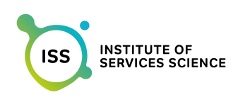My current research interests are situated in the crossroad of the domains of Services Science, Digital Transformation and Information Systems Evolution. Besides, I am expert in the areas of Situational Method Engineering (SME), Requirements Engineering (RE), and Information Systems (IS) Engineering and Evolution.
Digital transformation is today a must in all societies: business, public organizations, and private life. It is not limited to the adoption of new information technologies. Digital transformation embraces innovation and creativity in enterprise activities and governance, and is key for its sustainability and prosperity. In this domain I’m interested in exploring how the concept of information service supports the development of business activities and their digital transformation.
- Information Services and Services Systems: We have developed the notions of information service and services system as prospective means to deal with information systems complexity, fragmentation and evolution. Currently, we are working on the approaches supporting the transition from legacy IS to the information services and services systems.
- Transdisciplinary Information Services: Transdisciplinarity and its impact on information services engineering is another topic that I’m passionate. I’m working on principles and approaches for information services co-design in the transdisciplinary context, in particular, the introduction of creativity, innovation and gaming techniques in service engineering processes.
- Tiers-Lieu (Third Place) for Services: Recently we started to develop a contributory and exploratory approach supporting the co-creatinon of robust and cognitively embedded transdisciplinary information services. The approach shall give the responsibility to the service builders to ensure business and societal progression.
- Requirements Engineering for Services: Requirements engineering in the services science context has a few characteristics that makes it different from the traditional software RE. The main challenges in information service engineering include the volatility of service requirements, the necessity to involve the end users in the service design and to make them co-creators of the service, and the continuous evolution and adaptation of information services. RE for information services is one of my current research topics.
Sustainability of enterprise IS largely depends on the quality of their evolution process and the ability of the IS evolution steering officers to deal with complex IS evolution situations. Taking a decision related to any IS change can be a troublesome responsibility because of the amount of information that has to be processed and the uncertainty of the impact of the change on the enterprise and its IS. To reduce this uncertainty, we are developing a conceptual framework for IS evolution steering taking into account the following challenges:
- IS Dimensions and Complexity: The most challenging in taking IS evolution decisions is to have a complete understanding of the situation, i.e. to have the right and thorough information. To deal with this challenge we have developed a metamodel, named IS-SM (Information System Steering Model) that allows to capture how enterprise IS are implemented (the structure of the information), how they support enterprise business activities, and how they comply with regulation policies governing these activities. With the help of this model we are able to implement an Informational Steering Information System – ISIS.
- Responsibility Issues in IS Evolution Steering: Based of IS-SM, we are developing an approach for analysing how the responsibility space of an IS actor (user) can be impacted by a particular IS evolution. With this approach we aim to help the IS evolution steering officers to assess the impact of IS change and to reduce the risk of inappropriate decisions.
- Guiding the IS Evolution: Operationalization of an IS evolution is not only a question of a right decision but also a question of a right way to do it. Currently, we are working on the approach for decomposing a complex IS evolution into elementary operations and the guidance to execute them in a real context.
- Reorganizing an Enterprise thanks to its IS: IS evolution and enterprise reorganization are closely related. Usually, IS evolution is considered as a necessary consequence of enterprise reorganization. In our work we are exploring the opposite way, i.e. IS evolution as an underlying way to the enterprise reorganization, in particular, how our approach for IS evolution steering could be used to take enterprise reorganization related decisions.
The main objective of this discipline is to provide techniques and tools to support situation-specific method engineering for software and information systems development and evolution. My contriutions and interests in this domain:
- An approach for Assembly-based Situational Method Engineering: I have developed a systematic approach for situation-specific method construction by selecting and assembling method chunks stored in a method repository. This approach is based on the notion of method chunk and the assembly process which allows to consider the particular situation and requirements of each IS development project and to construct a method the best fitting this situation.
- Process Modeling Formalism MAP: I have participated in the development of the process modelling formalism called MAP which allows to combine in the same model several ways to guide an engineering process. This multi-process representation is based on two main concepts – intention and strategy – where several strategies can be provided to achieve the same intention. MAP is used to formalise situation-specific methods.
- Application of SME to formalise various methods: CREWS-L’Ecritoire, RESCUE, SUPERSEDE,...
- MaaS – Method as a Service: This is a revision of the notion of method chunk in the service-driven context. The objective of this work is to improve the definition of method service granularity, interoperability and availability.
- Method Family: The aim of this work is to capture the commonality and variability of similar methods into a family of methods with the aim to facilitate method tailoring according to the company or project requirements.
I’m interested in definition of methods dedicated to different information systems and services engineering situations. In particular, I have participated in the following realisations:
- Interoperability of IS: This work was supported by the European Network of Excellence NoE INTEROP, IST – 508011. We have developed an approach based on a collection of method chunks dealing with IS interoperability issues and a framework for characterising interoperability situations and identifying interoperability problems/opportunities. Three case studies were realised to evaluate our approach.
- E-government: This work was realised in collaboration with the R&D Centre of the State of Geneva, Switzerland. We have developed an approach for institutional ontology engineering based on low analysis. This ontology is then used as a background for institutional IS development.
- IS Evolution by Integration of New Services: This work was supported by the Swiss Research Foundation. We have developed a situational approach to support enterprise legacy IS evolution by integrating new services. This approach is based on the notion of information service (ISS). We have provided a metamodel and guidelines for ISS design and integration into existing IS. The method for ISS integration into legacy IS is composed of a collection of method chunks; it also provides guidance for method chunks selection according to the project situation and evaluation of the impact of ISS integration.
- IS Security Management: I have participated in the formalisation of a generic IS security management processes by using MAP formalism. This process model integrates different existing techniques into one multi-process model. This work was realised in collaboration with the Public Research Centre Henri Tudor, Luxembourg.
- Distributed IS Development: We have developed a framework supporting project management in distributed development of information systems: a support to identify and manage risks caused by different kinds of distances (geographical, temporal, socio-cultural, etc.).
|

